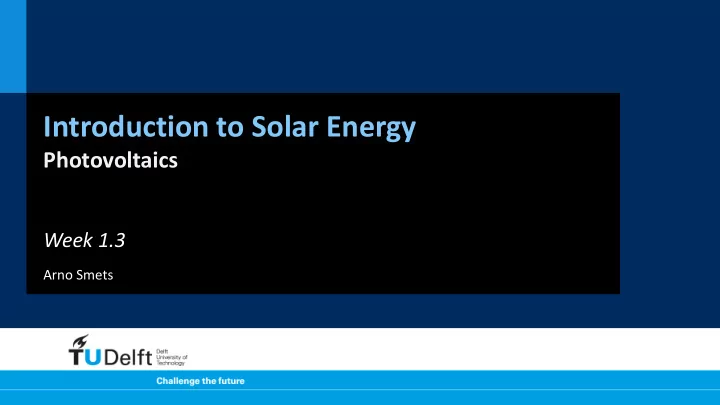

Introduction to Solar Energy Photovoltaics Week 1.3 Arno Smets
Solar cell operation front contact n-type silicon - + + - + - pn junction +- back contact p-type
Solar cell operation Front contact n-type c-Si n-type c-Si depletion region p-type c-Si absorber depletion region p++-type Si membrane back contact
Solar cell operation Front contact n-type c-Si n-type c-Si depletion region p-type c-Si absorber depletion region p++-type Si membrane back contact
Solar cell operation Front contact n-type c-Si n-type c-Si depletion region p-type c-Si absorber depletion region p++-type Si membrane back contact
Solar cell operation Front contact n-type c-Si n-type c-Si depletion region p-type c-Si absorber depletion region p++-type Si membrane back contact
US$ 0.1/W p US$ 0.2/W p US$ 0.5/W p 100 80 Efficiency [%] 60 W p /m² US$ 1.0/W p III 40 Present limit 20 US$ 3.5/W p I II 0 100 200 300 400 500 Cost [US$/m 2 ]
Wafer-based crystalline silicon finger “ inverted ” pyramids double layer antireflection coating p+ n+ n thin oxide ( 200 ) p+ p+ oxide Source: University of New South Wales, Australia
Superstrate solar cell Thin-film silicon structure Glass superstrate TCO p-type Intrinsic a-Si:H n-type Metal electrode
Cadmium Telluride Glass TCO (ZnO:Al) CdS (n-type) CdTe (p-type) Metal contact Source: http://www.flickr.com/photos/ferriday/5815935109/
CIGS NiA1 MgF 2 TCO (ZnO:Al) TCO (intrinsic ZnO) CdS (n-type) CuInSe 2 (p-type) Mo Glass
Organic/Dye sensitized Solar Cells Source: Solarmer Energy Source: Fraunhofer ISE
III – V PV Technology
PV technologies Emerging and novel technologies Quantum dots Front a contact p n Rear Down-convertor Up-convertor contact IBC
Thank you for your attention!
Recommend
More recommend